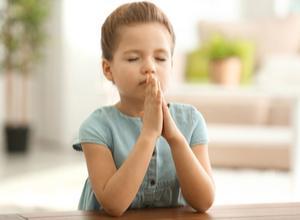When Parents' Faiths Collide After Divorce
 Families across the country have begun observing Lent, which may include periods of fasting and abstaining from vices. Parents who are serious about their faith choose to observe the Lenten traditions, while younger children are likely following the example of their parents. What if the children's parents are divorced and one chooses to not observe Lent? The parent who does observe Lent may be upset with the other parent for allowing their children to lapse in their Lenten commitments. This is just one example of how different religious beliefs can cause conflict between divorced parents. They may be less willing to tolerate each others’ differing beliefs than when they were married. Divorced parents should try to respect their religious differences for the sake of their children.
Families across the country have begun observing Lent, which may include periods of fasting and abstaining from vices. Parents who are serious about their faith choose to observe the Lenten traditions, while younger children are likely following the example of their parents. What if the children's parents are divorced and one chooses to not observe Lent? The parent who does observe Lent may be upset with the other parent for allowing their children to lapse in their Lenten commitments. This is just one example of how different religious beliefs can cause conflict between divorced parents. They may be less willing to tolerate each others’ differing beliefs than when they were married. Divorced parents should try to respect their religious differences for the sake of their children.
Legal Rights
In Illinois, the parent who receives a majority of the decision-making responsibilities is likely to be the one who chooses which religion the children will primarily follow. However, the other parent may still have the right to include the children in his or her own religious activities. A divorce court will not favor one parent’s religion unless it believes the religious practices are harming the children. Examples include:
- Religious traditions that involve physically abusing children;
- Foregoing conventional medicine at the risk of the children’s health; or
- Denying children their basic rights as part of a belief system.
Learning to Coexist
You have the right as a parent to petition for greater control over your children’s religious upbringing, but you should first understand your motivations. A difference of opinion is not a legal reason to deny your co-parent the right to share his or her religious beliefs with your children. Consider that:
- Your co-parent’s religious beliefs are part of your children’s family history;
- Children of divorce are healthier when they feel an understanding and connection with both parents;
- Experiencing different religious traditions does not mean your children have been indoctrinated into the faith;
- When you look past the unique traditions, many religions share the same core values; and
- You should allow your children to choose their own religious beliefs.
Children can observe multiple religious traditions without any conflicts. When conflicts do arise, you should discuss the issue with your co-parent and make a decision that is in the best interest of the children. As they grow older, your children can make their own decisions regarding which religion they favor.
Faith After Divorce
Divorced parents who fight over their children’s religious upbringing may make religion a negative experience for their children. A Kane County family law attorney at Goostree Law Group can help you reach an agreement about religious decisions related to your children. Schedule a free consultation by calling 630-584-4800.
Source:
http://www.divorcemag.com/blog/things-to-consider-as-co-parents-with-different-religions











